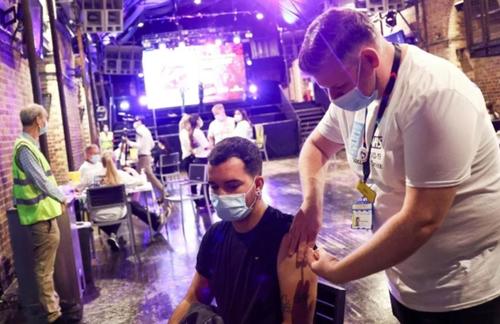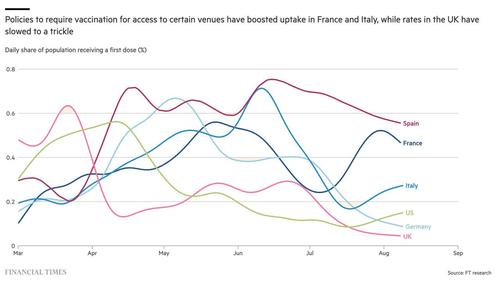“People Are Genuinely Trying To Make An Informed Decision” – Why Vaccine Giveaways & “Freebies” Don’t Work
Since the vaccines were first offered to the broader population earlier this year, state and municipal governments across the US have tried to incentivize more adults to get the jabs by offering money, free beer, and entry into a lottery for millions of dollars to try and draw more people to get the vaccine. For some, this has bred resentment, as the vaccinated have questioned why they’re being penalized for complying with the government’s demands.
As France resorts to using more heavy handed measures, like requiring vaccination passports for people to dine at restaurants The FT is the latest to take on this issue as the world wonders whether there might be a more humane alternative to government’s forcing people to take an experimental vaccine. As the FT points out, across the US “inducements to receive COVID jabs are proliferating…states are offering rewards ranging from $100 cash to free beer, theme park tickets and lottery tickets. In the UK, freebies include fast food and free taxi rides.”
But now that NYC has started requiring vaccine passports for gym-goers and restaurant patrons, many other cities are considering following in their footsteps. And when the time comes, how will the rest of the world handle it? For now, per the FT, battling vaccine hesitancy is still very much a “rich-country problem”.
Any governments considering adopting additional “incentives” (perhaps before choosing a harsher, more authoritative route) should probably consider these criticisms, laid out by the FT, which spoke to a handful of academics, including Psychology Professor Stephen Reicher, from the University of St. Andrews. He told the FT that incentive schemes have “many complexities and many pitfalls” and – like vaccine passports – could have a “polarizing effect.”
“People who were going to get vaccinated anyway might say to themselves: ‘OK well I’ll do it a bit more quickly’ . . . On the other hand, those who are reluctant become more negative and more resistant,” says Reicher. “Precisely the people you want to win over can be the people you alienate.”
Initial data show that, in France, the introduction of Macron’s strict requirements led to a bump in demand for vaccination appointments, but that this only lasted a week, before bookings for appointments trended lower once again.
Source: FT
A public health official from Arkansas perhaps put it best: when it comes to vaccines “people genuinely wish to make an informed decision and that doesn’t add new information, she said, referring to “freebies” like lotteries and giveaways.
So, if giveaways and don’t work, then what are some strategies that might?
Others believe recruiting more “influencers” to act as “age-appropriate” spokespeople for the 18-34s who are still refusing to get the jab might be an effective strategy. The US has already tapped into this by enlisting teenage pop star Olivia Rodrigo in its campaign.
While they’re trying to reach out to the right age demographic, they should also take a second to figure out which demographic groups are also worth targeting. While much ink has been spilled about minorities and their skepticism of vaccines, one recent study showed that the most highly educated Americans are also the most vaccine-hesitant.
Research in the UK shows that vaccination rates are lower among “people of black Caribbean and African heritage” as well as those “living in ore deprived areas”, according to the FT.
It’s this second group that some experts believe to be the “lowest hanging fruit.”
Although information campaigns and vaccine passports and incentives attract public attention, many experts say the most effective way to increase uptake is simply to make it as easy as possible for those who are short of time and motivation — but not actively opposed to vaccination — to get their jabs.
“The lowest hanging fruit are those who continue to lack access to the vaccine,” says Maureen Miller, an infectious disease epidemiologist at Columbia University in New York. She adds that adverts in languages other than English, making clear that jabs are free and do not require health insurance or proof of immigration status, are critical for capturing those who want a jab but are nervous.
“Anything that gets anybody vaccinated is important, but in order to get the larger numbers we need to make it convenient, and not scary,” she adds.
NYC is probably done the most of any western city in this regard, due to its pop-up vaccination centers in subways and other public spaces. Success has still been pretty limited, however.
The experts quoted in the FT report all reportedly agreed that vaccine requirements should be in place for international travel, due to a “long history of vaccination certificates” as well as some jobs involving human contact (thought French PM Emmanuel Macron’s and Mayor de Blasio’s edicts requiring health-care workers to be vaccinated have proven more controversial than those leaders may have anticipated).
While governments will likely mandate jabs for international travel, three US carriers – Delta, Southwest and American announced on Wednesday that they would break with United and opt not to require proof of vaccination from customers flying domestic.
Especially as “the science” raises more questions about the efficacy of the vaccines, for now, the best strategy for convincing people that the jabs are safe would be for the FDA to finally officially approve them. Though even that might not be enough for many skeptics concerned about the long-term effects.
Tyler Durden
Wed, 08/11/2021 – 19:20
via ZeroHedge News https://ift.tt/3xJgfp0 Tyler Durden

